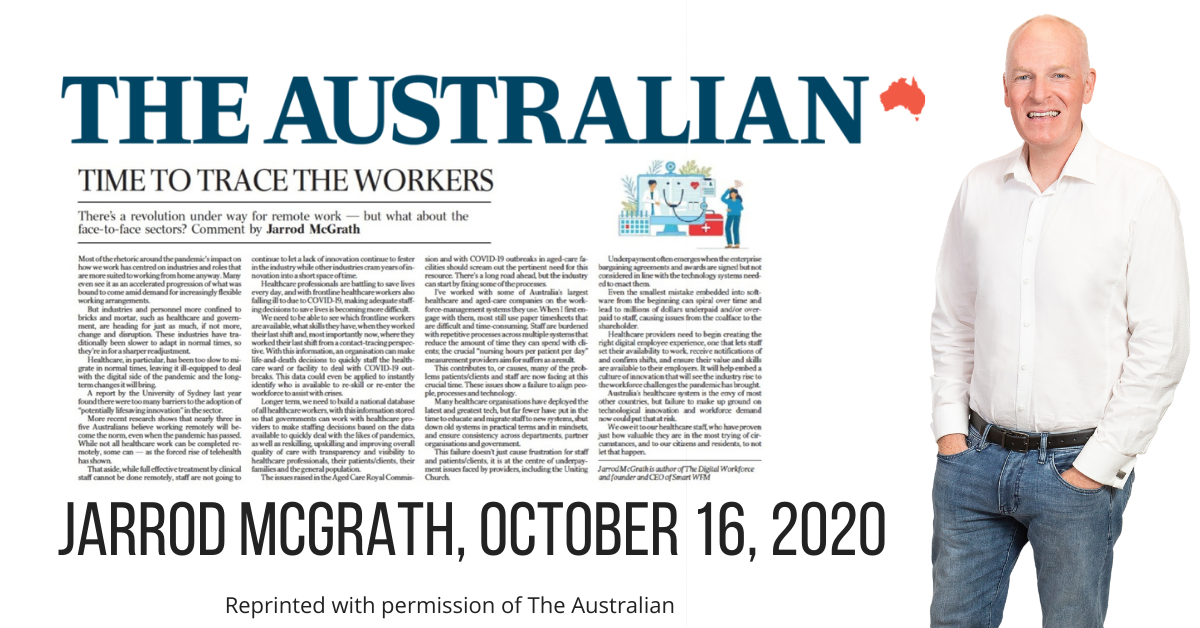3 min read
Tech industry would do well to remember we're not all knowledge workers
 Jarrod McGrath
February 03, 2022
Jarrod McGrath
February 03, 2022
.jpg)
Read the paradox of Australia's declining productivity despite the tech industry's boom, with an insightful analysis by Jarrod McGrath originally published on The Australian Business Review. He went through the disconnect between tech promises and delivery, emphasising point solutions over transformative journeys.
Australians are an average of $11,500 worse off per year than they should be due to a decade-long slump in productivity, according to the latest report from the Productivity Commission.
Meanwhile, the tech industry - which professes it's here to make us all more productive – is positively booming. VC firms like AirTree have charged to a $2 billion plus valuation with its tech portfolio success, while Afterpay has broken records with a $39 billion merger in an industry that has barely started.
How is it that this industry, now estimated to be worth $167 billion to the Australian economy and counting, is not helping us at least keep pace with productivity?
Perhaps the unexpected work-from-home revolution, which can boost output while sometimes improving people's wellbeing according to the Productivity Commission, will realign us. Even if that's true, we have to wonder what happens when we hit that ceiling.
I believe the tech industry has the opportunity, and should challenge itself, to dig deeper and align its role directly to productivity to lift us out of this lull.
Point solutions solve point problems
Despite productivity, efficiency and effectiveness being the central theme of most tech companies' 'About Us' boilerplates, there is a clear issue in that the tech industry is not meeting on its promises to actually improve productivity for businesses.
It delivers point solutions, a series of answers to a series of problems at a point in time. Some provide a mix of point solutions, which tend to integrate. Some integrate with other companies' point solutions, but many don't.
What's missing is the journey - digital transformation may hold the record for the most (over)used buzzword, but tech companies for the most-part fail to take companies on any kind of transformation journey. There is little to no effort to understand how the technology matches up to those companies' people and the environment in which they operate. Solutions are typically sold through the IT department without input from other areas of the business - a knowledge worker- to-knowledge worker transaction.
The term knowledge worker was coined back in 1966 by Austrian-American author Peter Drucker, who later declared these workers and their productivity would be the most valuable asset of a 21st-century institution. However, the term was defined by him in others by its separation from labourers', and this separation has continued throughout the tech revolution.
That means the coal face is ignored - the bakers, the cashiers, the farmers, the people in the emergency room we hope we'll never need to rely on. We all need knowledge worker solutions, but not all of us are knowledge workers.
The disconnect extends to tech companies' vision of the future workplace – brazen calls from the Atlassians and Canvas of the world saying we'll only need to come into work eight times a year or less. Having worked on and working with both sides of the fence, I know - as most of us do – this isn't a reality for everyone, and tech should be more inclusive in its vision of the future.
Getting to the bigger picture
An enhanced role for the tech sector couldn't come at a better time. Whether right or wrong, the Federal Government has tasked the industry with solving two of our biggest problems: climate change and post-Covid economic recovery.
Rising to these challenges will require more than just expanding its share of GDP contribution or increasing the industry's national export value. Tech needs to think bigger, recognise that we're all part of it, and focus on how it can enable people, because tech won't solve these problems - people will, tech is a tool but one that can work harder for us.
Knowledge workers in the industry need to step outside the 'hyperactive hivemind', as author Cal Newport labels it, and step into the world of industries that have existed for much longer, and in cases like manufacturing, mastered productivity to a fine art.
What do these workers need from tech? What processes need to change at the heart so that the tech works for them? What challenges will the people using this tech encounter and how can we help them overcome them?
With emerging technology reaching a point where it will displace 1.5 million Australian jobs while creating 1.7 million new ones, the industry also needs to look at how it can collaborate with other industries and government to alleviate justified fears, re-skill and retrain, and build long-term trust in a more digitised future.
But too many tech companies and leaders are stuck in knowledge-worker bubbles, focused on point solutions, making decisions in isolation, and not recognising the bigger picture: maximising people value.
Changing to people-first technology is the hard yakka needed to lift us from our 70-year productivity slump. I believe it can create an Australian economy where tech stretches far beyond its GDP value, lives up to the promise of giving us greater freedom, and solves our greatest challenges.
Jarrod McGrath is author of The Digital Workforce and CEO of Australian-headquartered human capital management consultancy Smart WFM.
Originally published by The Australian Business Review
Jarrod McGrath, February 03, 2022

The knowledge worker dilemma – why we’re struggling with productivity
Read Jarrod's blog, originally published on HRWorld SEA, about the challenges hindering productivity growth in the Asia-Pacific region and explore...

The Canberra Times: To create change, we need to stem Australia's productivity slide, Jarrod McGrath
The Productivity Commission's long-awaited five-year report found Australia is the most unproductive it's been in 60 years, with productivity falling...

